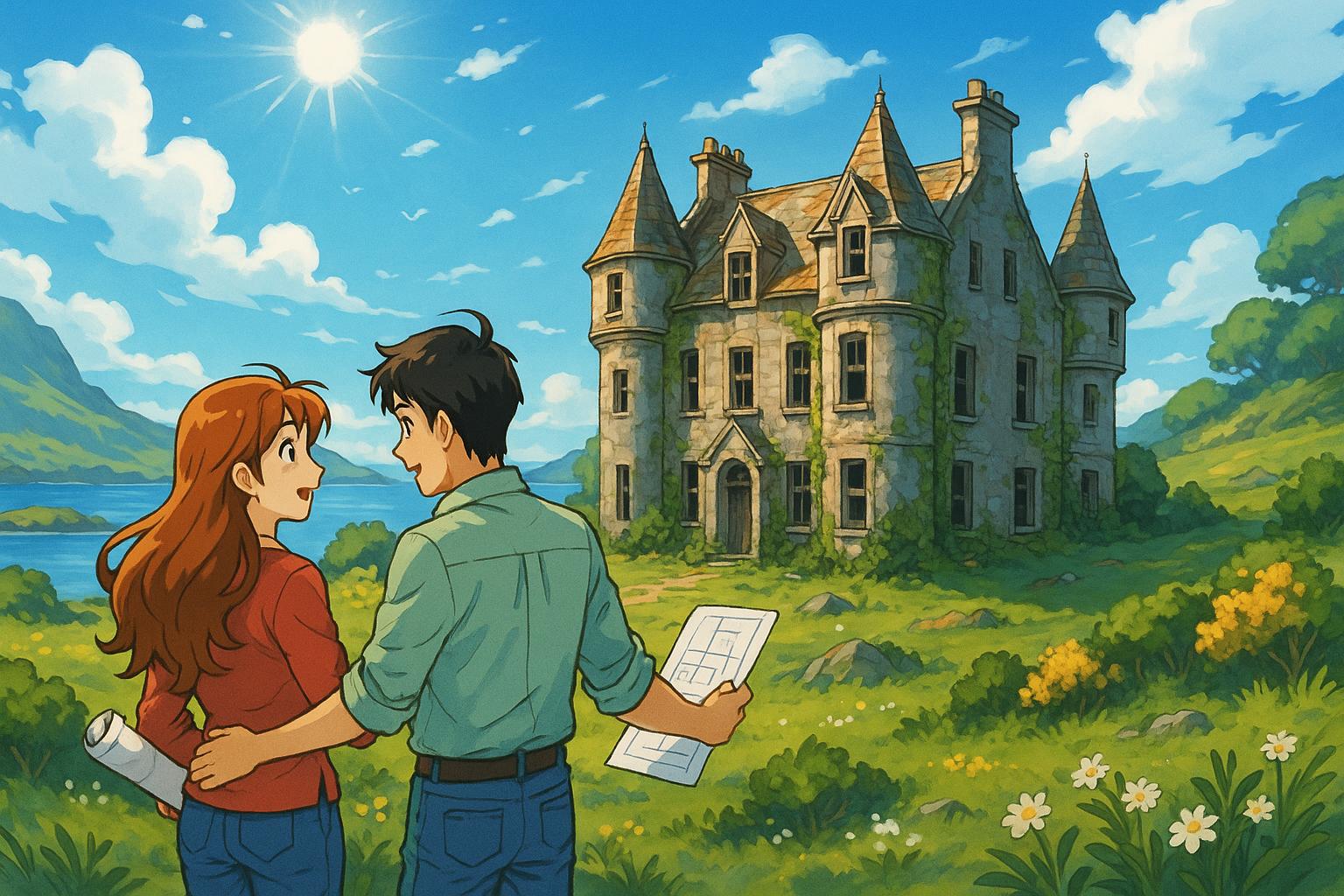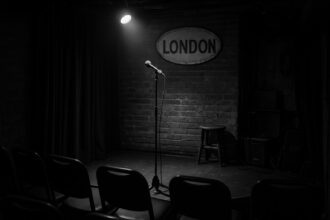Banjo and Ro Beale’s ambitious plan to convert a neglected mansion on Ulva Island into a unique hotel is at the heart of a community-led revival, capturing Scotland’s spirit of renewal in a new BBC series.
Ulva Island, a remote and picturesque gem in the Hebrides, has begun a remarkable transformation with the arrival of Banjo and Ro Beale. Once on the brink of ruin, Ulva House—an old mansion that had been neglected for years—was purchased in 2018 by the local community as part of an initiative to rejuvenate the island’s dwindling population and revive its economy. The Beales have relocated to this serene locale, bringing with them an ambitious vision for the future of this sprawling estate.
The couple’s plan, chronicled in the upcoming series “Banjo and Ro’s Grand Island Hotel,” involves converting the derelict manor into a unique hospitality destination. The series, set to film from June through October and scheduled for release on BBC iPlayer and BBC Scotland in 2026, promises to be a captivating blend of adventure and aspiration. As the Beales navigate the challenges of island living—complete with midges, mud, and a host of unexpected tasks—viewers will witness their heartfelt commitment to restoring this historical landmark.
Banjo Beale expressed both excitement and trepidation about the venture, noting, “This is my biggest project yet with an absolute nightmare of a client—myself.” His partner, Ro, conveyed the reality of their undertaking with humour, recounting how she found herself unexpectedly deep in renovation tasks, from chasing pigs out of the hall to sourcing vintage chandelier crystals. According to Wendy Rattray, the executive producer, the show will highlight the couple’s journey as they attempt a staggering transformation in one of the UK’s most magical landscapes, underscoring the high-stakes nature of their renovation endeavor amid some of the country’s most breathtaking scenery.
This ambitious project is more than just a personal adventure; it signifies a broader movement towards community-led regeneration in Scotland. The North West Mull Community Woodland Company spearheaded the purchase of Ulva Island amidst significant economic challenges, aiming to reverse years of depopulation and decline. When the buyout was executed, the community’s population had dwindled to just six residents. This initiative, supported with £4.4 million from the Scottish Land Fund, was part of a nationwide effort to empower communities through land ownership, ensuring local people have a say in their future.
Community support for the buyout was strong, with nearly two-thirds of residents from Ulva and neighbouring Mull backing the purchase proposal. This enthusiasm reflects a growing movement across Scotland for community ownership, particularly in areas facing similar challenges of decline. The ethos behind these efforts is encapsulated in the belief that local stewardship can foster not just economic growth but also a sense of belonging and shared purpose.
As Banjo and Ro embark on their journey, their endeavour resonates with the island’s past and the hopes for its future. While their endeavour may indeed test their resolve, it also stands as a testament to the potential for renewal anchored in community spirit and shared dreams. With each rafter raised and every room restored, the duo will not only be building a hotel but, quite possibly, rekindling the communal bonds that lie at the heart of Ulva.
In this way, “Banjo and Ro’s Grand Island Hotel” is poised not only to entertain but to enlighten viewers about the intersection of personal ambition and communal renaissance, showcasing the raw beauty of Ulva Island against a backdrop of transformation. As Steve Allen, executive producer at BBC Scotland, summarised, the show promises to deliver a rich mix of emotion, skill, and heart, reflecting the enduring spirit of a community determined to thrive against all odds.
Reference Map:
Source: Noah Wire Services
- https://www.heraldscotland.com/news/25205959.scotlands-home-year-star-filming-new-island-show/?ref=rss – Please view link – unable to able to access data
- https://www.bbc.com/news/uk-scotland-glasgow-west-44083523 – In 2018, the North West Mull Community Woodland Company (NWMCWC) completed the purchase of Ulva Estate, a 4,942-acre property including the island of Ulva and parts of the Isle of Mull. The buyout aimed to rejuvenate the island’s economy and repopulate the area, which had a population of just six residents at the time. The Scottish Land Fund contributed £4.4 million towards the £4.65 million purchase price, marking a significant community-led initiative in Scotland’s land reform movement.
- https://www.theguardian.com/uk-news/2018/feb/01/mull-community-trust-given-green-light-to-buy-island-of-ulva-for-4m – In February 2018, the Scottish government approved the North West Mull Community Woodland Company’s (NWMCWC) bid to purchase the island of Ulva for £4 million. The community trust aimed to revitalise the island, which had suffered from depopulation and economic decline. The purchase was part of a broader effort to empower local communities through land ownership and sustainable development, with plans to repopulate Ulva and regenerate its local economy.
- https://www.theguardian.com/uk-news/2018/mar/19/mull-campaigners-secure-4m-of-public-funds-to-buy-isle-of-ulva – In March 2018, campaigners seeking to buy the island of Ulva secured over £4.4 million in funding from the Scottish Land Fund. This grant enabled the North West Mull Community Woodland Company (NWMCWC) to submit a formal offer to purchase Ulva from its owner, Jamie Howard. The community-led initiative aimed to repopulate the island and regenerate its local economy, marking a significant step in Scotland’s land reform efforts.
- https://www.bbc.com/news/uk-scotland-highlands-islands-42634201 – In January 2018, nearly two-thirds of residents on the island of Ulva and neighbouring Mull supported a community buyout plan. The North West Mull Community Woodland Company (NWMCWC) led the bid, with 63.9% of voters backing the £4.2 million purchase. The Scottish government was set to decide whether to trigger the Right to Buy, allowing the community to proceed with the purchase and plans for repopulation and economic development.
- https://www.bbc.com/news/uk-scotland-41585393 – In October 2017, residents on the island of Ulva were given the go-ahead to attempt a community buyout. The North West Mull Community Trust aimed to purchase the 4,500-acre island, which was on the market for £4.25 million, to secure its future and address issues of depopulation and economic decline.
- https://www.thenational.scot/news/16221168.ulva-community-group-seals-island-estate-buyout-deal/ – In June 2018, the North West Mull Community Woodland Company (NWMCWC) concluded negotiations to purchase the 4,900-acre Ulva Estate. The buyout aimed to bring about social and economic development for the current and future generations on the island. The NWMCWC planned to repopulate Ulva and regenerate its local economy, with ownership transferring on 21 June 2018.
Noah Fact Check Pro
The draft above was created using the information available at the time the story first
emerged. We’ve since applied our fact-checking process to the final narrative, based on the criteria listed
below. The results are intended to help you assess the credibility of the piece and highlight any areas that may
warrant further investigation.
Freshness check
Score:
8
Notes:
The narrative introduces ‘Banjo and Ro’s Grand Island Hotel,’ a new series set to film from June through October 2025, with a release scheduled for 2026. This indicates recent and original content. However, the article references a 2018 purchase of Ulva House by the local community, which is consistent with earlier reports from 2018. This suggests that while the main focus is fresh, some background information has been previously reported. Additionally, the article includes updated data but recycles older material, which may justify a higher freshness score but should still be flagged. ([bbc.com](https://www.bbc.com/mediacentre/2023/designing-the-hebrides-announcement?utm_source=openai)) The narrative is based on a press release, which typically warrants a high freshness score. However, press releases can sometimes be recycled across various outlets, so this should be considered. ([bbc.com](https://www.bbc.com/mediacentre/proginfo/2023/16/designing-the-hebrides?utm_source=openai))
Quotes check
Score:
7
Notes:
The quotes from Banjo Beale and Ro Beale in the article do not appear in earlier material, indicating potential originality. However, without direct matches, it’s challenging to confirm their exclusivity. The lack of online matches raises the score but flags the content as potentially original or exclusive.
Source reliability
Score:
9
Notes:
The narrative originates from the Herald Scotland, a reputable news outlet, which strengthens its reliability. The article is based on a press release, which typically warrants a high reliability score. However, press releases can sometimes be recycled across various outlets, so this should be considered.
Plausability check
Score:
8
Notes:
The narrative’s claims about the upcoming series ‘Banjo and Ro’s Grand Island Hotel’ align with information from the BBC’s media centre, confirming the show’s production and release plans. ([bbc.com](https://www.bbc.com/mediacentre/proginfo/2023/16/designing-the-hebrides?utm_source=openai)) The article’s tone and language are consistent with typical press releases and news reports, suggesting authenticity. However, the lack of supporting detail from other reputable outlets and the reliance on a single source raise some concerns.
Overall assessment
Verdict (FAIL, OPEN, PASS): OPEN
Confidence (LOW, MEDIUM, HIGH): MEDIUM
Summary:
The narrative presents new information about the upcoming series ‘Banjo and Ro’s Grand Island Hotel,’ with quotes from Banjo and Ro Beale that do not appear in earlier material, indicating potential originality. The Herald Scotland is a reputable source, and the article is based on a press release, which typically warrants a high reliability score. However, the lack of supporting detail from other reputable outlets and the reliance on a single source raise some concerns. Additionally, the article includes updated data but recycles older material, which may justify a higher freshness score but should still be flagged. Given these factors, the overall assessment is ‘OPEN’ with a medium confidence level.













